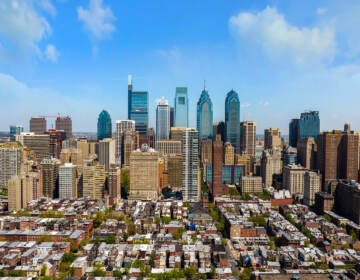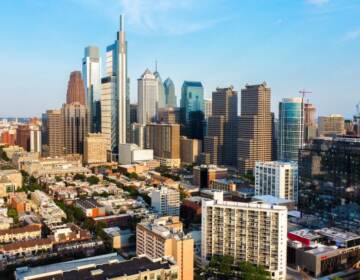Landlords expected to raise rents due to city reassessment
Rents in Philadelphia are rising and could go higher with the average 31% property tax increase coming next year.

Rowhouses are seen Tuesday, Nov. 24, 2015, in Philadelphia. (AP Photo/Matt Rourke)
This story originally appeared on The Philadelphia Tribune.
Like everything else, rents in Philadelphia are rising and could go higher with the average 31% property tax increase coming next year.
“Typically, in our previous research looking at property tax increases, the evidence shows that the landlords pass it on to the tenants,” said Michael Shields, director of research for the Economy League of Greater Philadelphia.
Average rents in the city were $1,659 in April, an 8.5% increase from the same month in 2021, according to a report from the Economy League. The group crunches numbers based on estimates by Zillow, which tracks rental and home prices nationwide.
About 48% of Philadelphia households are considered to be “rent burdened,” that is, spending more than 30% of their income on rent, according to the league’s report. That number has been consistent since 2006.
By contrast, the national average of households who are considered “rent burdened’ has been going down since 2011, and is currently about 30%.
The percentage of rent burdened city residents could go even higher with the expected rental hike, experts said.
“The drum that we’ve been beating for a long time is that our region and especially the city have seen stagnant wage growth for decades,” said Shields, of the Economy League. “The fact that the cost of living keeps rising but people’s incomes are not matching the cost of living, we are setting ourselves up for major issues down the road.”
Typically, landlords raise rents to keep up with inflation. The 8.5% hike in April is in pace with inflation right now, landlords say.
Paul L. Badger, Jr., president and CEO of the Badger Group, LLC, which has rental properties throughout the city, said he has not yet calculated how the reassessment will affect any rental increase.
“Many landlords are anticipating the need to increase rents in order to stay afloat,” Badger said. “A major contributing factor is the tax reassessment, but also compounding the issue are increased maintenance, labor and material costs.”
Some property owners with adjustable mortgages are facing rising interest rates, he said.
Another landlord with properties in north and west Philadelphia, who didn’t want to be identified, said he expects to raise rents by 4% instead of the usual 2%, because of the reassessment. But that will not keep up with inflation and doing so might hurt his chances of keeping and attracting tenants.
Barry Williams, 61, who is employed in city government, has been renting an apartment in the Mount Airy section of Philadelphia for the past several years.
“It shouldn’t go up significantly in one jump,” Williams said. “After a while, you get priced out. Some people can’t afford it.”
Affordable housing units are likely most at risk due to already slim profit margins and lost income as a result of the pandemic, Badger said.
Shields of the Economy League agreed.
“There is a lot of good housing stock in the city,” Shields said. “But the prices are astronomical right now. We are not really building much low- to middle-income housing. It’s all in the luxury high-end market because that’s where the most profit is to be made.”
Rental assistance is available for those who qualify
Anticipating the probability of rental hikes on people still financially hurting from the pandemic, City Councilperson Kenyatta Johnson got Council to increase the amount of rental assistance for vulnerable residents to $15 million and added another $1 million to the city’s recently passed budget for people who might be illegally evicted.
But the city is still working on the details on how the money will be allocated.
Property tax relief is available for those who qualify
The state Department of Revenue has extended the deadline to apply for state’s Property Tax/Rent Rebate Program from June 30 to Dec. 31.
State Treasurer Stacy Garrity is urging state residents who are eligible to apply for the program.
“The Property Tax/Rent Rebate Program may be more important this year than ever before,” Garrity said. “Far too many Pennsylvanians are struggling to make ends meet, especially in the current economic climate with inflation rates higher that they’ve been in 40 years. Extending the deadline will give more people time to apply and receive their rebates.”
To be eligible for the program, you must be 65 or older, or a widow or widower age 50 or older. In addition, people with disabilities who are 18 or older are eligible. The maximum rebate is $650. Some homeowners might qualify for supplemental rebate.
According the Department of Revenue, about 400,000 Pennsylvanians benefit from the Property Tax/Rent Rebate Program each year, receiving a total of $250 million.
The treasurer’s office began processing the payments on June 30 and direct deposits began on July 1.
Find out if you’re eligible and how you can apply for the program by calling your state representative or state senator or visiting www.revenue.pa.gov. Submit an application at www.mypath.pa.gov.
WHYY is your source for fact-based, in-depth journalism and information. As a nonprofit organization, we rely on financial support from readers like you. Please give today.







